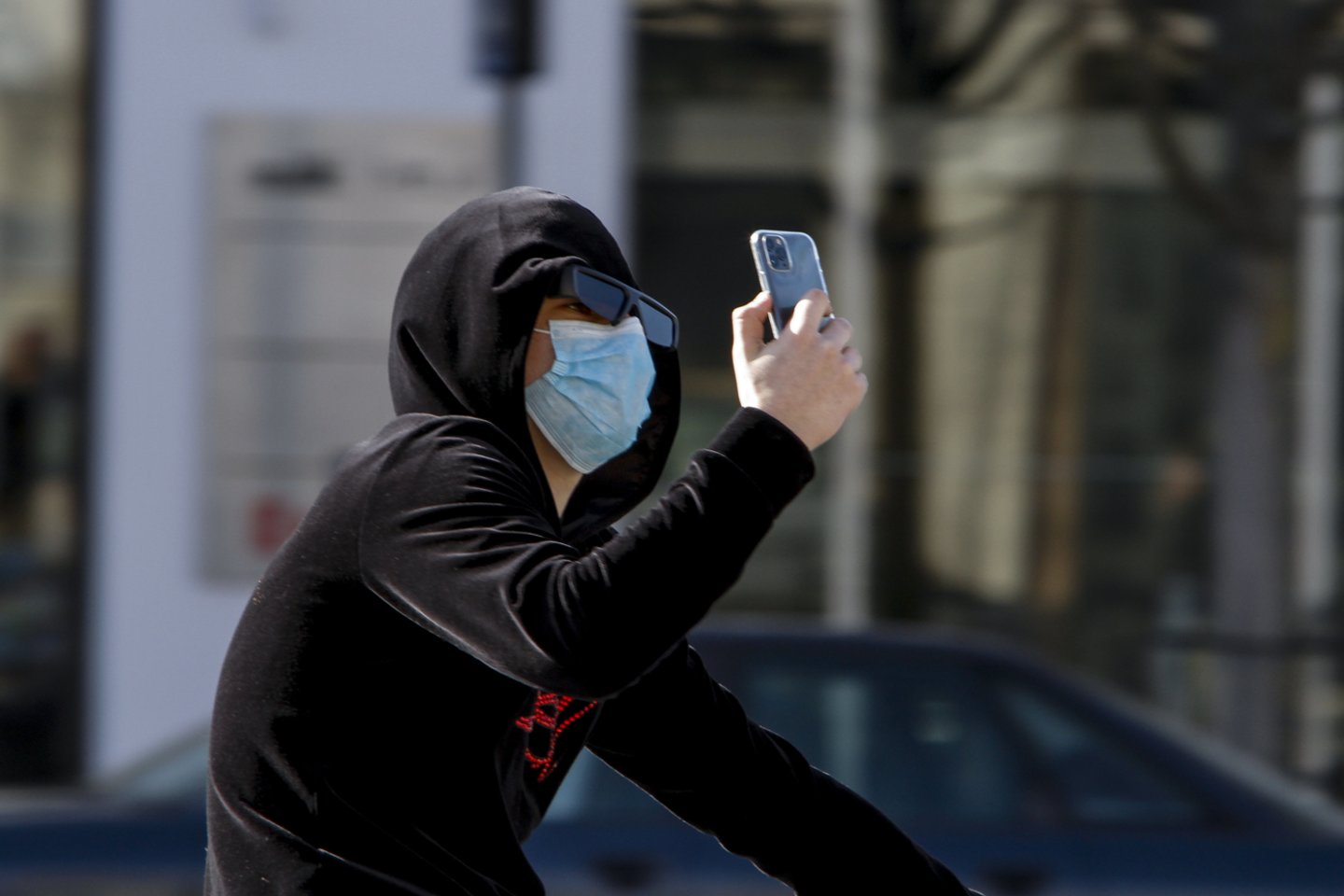„Has it been publicly announced that the biggest – the fifth – wave of the pandemic is over?“ – state data analysts excitedly announced on social media.
Statistics in recent weeks show that both initial and repeat infections have fallen.
„The fewer daily infections, the fewer new infections. The fewer new infections, the fewer infections per day“, is the simple formula given by the experts analysing the statistics.
Health experts can only speculate how long the decline seen since February will last.
„Until extinction, the suppression of a specific immune memory, or a new strain of the virus“, the analysts speculated.
Health experts hope that the end of the fifth wave, which arrived in Lithuania at the end of December last year, will coincide with the end of the pandemic.
Hospitals are emptying
Mindaugas Stankūnas, a professor at the Lithuanian University of Health Sciences, admitted that the number of patients in hospitals and intensive care units who are being treated for COVID-19 is decreasing at a very fast rate.
Between 1,500 and 1,600 infected people were treated in hospitals between 1 and 3 March, and a month later, at the beginning of April, the numbers ranged between 1,000 and 1,100. The number of patients in intensive care units is also decreasing.
„In Lithuania, the omicron BA.2 subtype is now the predominant type of virus, detected in 85% of cases.
This means we maintain the downward trend in the more infectious strain. This makes it even more encouraging to hope for even better news in the future,“ said Stankūnas.
The number of children with coronavirus has also fallen significantly recently. In early February, the incidence among 10-19-year-olds was at its pandemic peak, with 2 428 infections in a week. Still, since intensive testing began, the number of infections has fallen by a factor of 12.
Currently, around 200 school-age children are infected per week.
Will masks become routine?
Professor Saulius Čaplinskas, MD, PhD, warned that even if the pandemic is over, coronavirus will not disappear but will become a seasonal, endemic disease that was initially mistakenly equated by sceptics with the common cold or flu.
„The announcement of the end of the COVID-19 pandemic should not be interpreted as an end to the circulation of the virus. Diseases appear and do not disappear.
Therefore, declaring that the worst is over does not mean that the public should disregard and abandon protective measures or the effective specific prevention measure – vaccination“, said Mr Čaplinskas.
Although the Government has abolished the requirement to wear masks indoors and shortened the isolation period for infected people to five days, Health Minister Arūnas Dulkys also urged people not to relax: „In the future, self-examination tests, medical masks, respirators must become an everyday part of our lives, and we must have them all the time, just as we have our first aid supplies.“
The elderly will be vaccinated again
The Minister did not rule out the possibility that a fourth dose of the vaccine may be needed if coronavirus becomes a seasonal disease.
Lithuanian experts will discuss the need for a fourth dose soon, but it is hoped that a common decision will be taken across the EU.
The European Medicines Agency (EMA) has already approved a second booster dose of COVID-19 for people aged 80 years and older.
Experts stressed that it is too early to draw conclusions for other age groups.
Researchers predict that coronavirus infections will start to increase again in September and November.
According to Mr Čaplinskas, as coronavirus infection becomes endemic, it will continue to spread, causing outbreaks, but without overburdening the healthcare system or disrupting people's social activity.
„SARS-CoV-2 is likely to continue to make people sick, but the effects will be spread over a longer period of time, so we may not realise that they are as severe as those experienced over the last two years.
I think we are going to be living with COVID-19 for a very long time – the worst is yet to come,“ warned the professor.
After the pandemic, lawsuits
However, experts who faced the first and still unfamiliar wave of COVID-19 two years ago are in no doubt that the worst is over.
„At the beginning of the pandemic, our biggest fear was that it would be like Italy, where many people died. However, it didn't happen, the testing volume grew, and the pandemic was contained,“ said Algirdas Šešelgis, then Deputy Minister of Health.
He had to speak at the Vilnius Regional Court about how Lithuania met a new and unfamiliar disease, as law enforcement authorities were suspicious of the purchase of reagents and other supplies for laboratories after the pandemic subsided.
The purchase of pandemic management supplies is the subject of a number of court cases, and the experts who worked at the time say that there was no time to think and choose suppliers. Everyone was afraid that the health system would not be able to cope with the burden and that people would start dying in hospitals.
Rescuing a stranded parcel
Šešelgis said that when the reagents for COVID-19 were only available for a day or two, a shipment of them from abroad got stuck, and the Government assigned a Spartan military plane to bring it back.
The Deputy Minister travelled to Vilnius Airport late in the evening to pick up the important cargo, together with Vytautas Zimnickas, the then Director of the National Healthcare Laboratory, who is now dead.
„The specialists managed to avoid a crisis, there was no shortage of reagents for tests, and the laboratories were open 24 hours a day, seven days a week,“ said Mr Šešelgis.
Although Ministry of Health staff at the time admitted that they even feared going behind bars because of the increased mortality rate, the virus was contained, and the fear was allayed by the arrival of the first vaccines at the end of 2020.
Vaccines saved the day
Nearly 9 000 people have died from coronavirus in Lithuania in two years.
The number of deaths has been decreasing recently.
In the first week of April, for the first time in 7 months, the weekly number of deaths from COVID-19 fell below 90.
The death rate from COVID-19 started to increase while the delta strain was still predominant and peaked at the end of October last year when the coronavirus claimed 253 lives per week in Lithuania.
It is believed that the number of deaths started to decrease afterwards, both because of vaccines and because of the omicron strain, which does not cause such severe disease.
The highest number of deaths due to the spread of the omicron strain was recorded between 21 and 27 February, when 149 people died during the week.
„We can once again thank those people who have been vaccinated because the pandemic in Europe has hit the wall of those who have been vaccinated, even though the virus has been changing and throwing new surprises at us,“ Health Minister A. Dulkys said on the LRT radio programme, reminding us that Lithuania has already reached a 90% immunisation rate and is able to move on to a different life.

